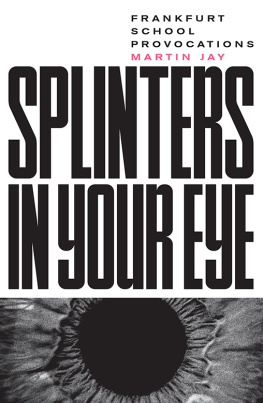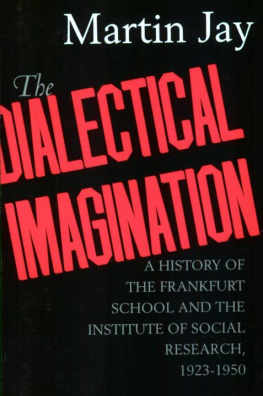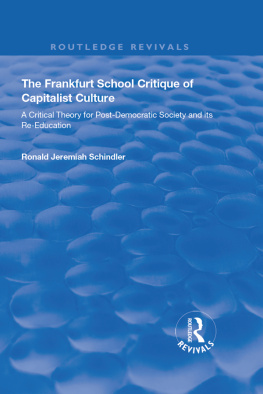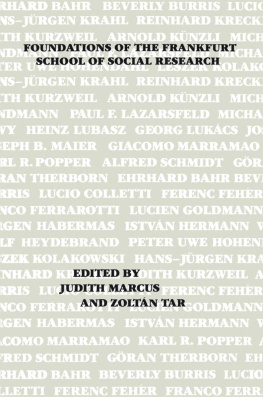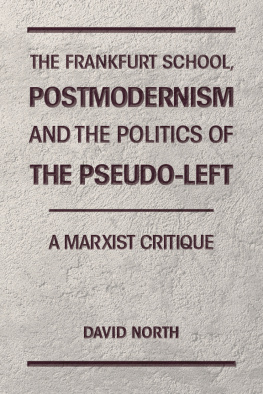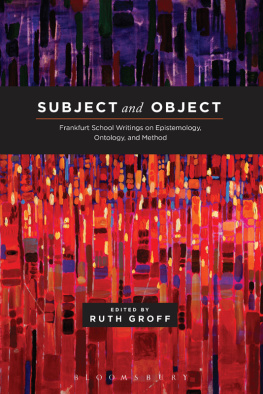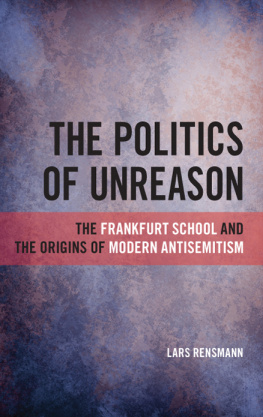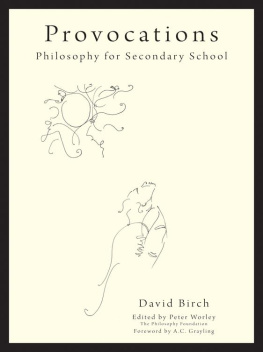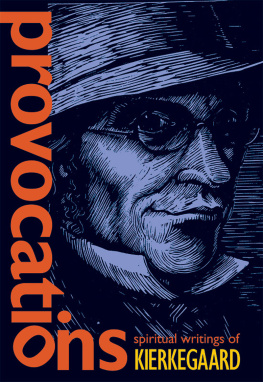Martin Jay - Splinters in Your Eye: Frankfurt School Provocations
Here you can read online Martin Jay - Splinters in Your Eye: Frankfurt School Provocations full text of the book (entire story) in english for free. Download pdf and epub, get meaning, cover and reviews about this ebook. publisher: Verso, genre: Detective and thriller. Description of the work, (preface) as well as reviews are available. Best literature library LitArk.com created for fans of good reading and offers a wide selection of genres:
Romance novel
Science fiction
Adventure
Detective
Science
History
Home and family
Prose
Art
Politics
Computer
Non-fiction
Religion
Business
Children
Humor
Choose a favorite category and find really read worthwhile books. Enjoy immersion in the world of imagination, feel the emotions of the characters or learn something new for yourself, make an fascinating discovery.
- Book:Splinters in Your Eye: Frankfurt School Provocations
- Author:
- Publisher:Verso
- Genre:
- Rating:3 / 5
- Favourites:Add to favourites
- Your mark:
- 60
- 1
- 2
- 3
- 4
- 5
Splinters in Your Eye: Frankfurt School Provocations: summary, description and annotation
We offer to read an annotation, description, summary or preface (depends on what the author of the book "Splinters in Your Eye: Frankfurt School Provocations" wrote himself). If you haven't found the necessary information about the book — write in the comments, we will try to find it.
Martin Jay: author's other books
Who wrote Splinters in Your Eye: Frankfurt School Provocations? Find out the surname, the name of the author of the book and a list of all author's works by series.
Splinters in Your Eye: Frankfurt School Provocations — read online for free the complete book (whole text) full work
Below is the text of the book, divided by pages. System saving the place of the last page read, allows you to conveniently read the book "Splinters in Your Eye: Frankfurt School Provocations" online for free, without having to search again every time where you left off. Put a bookmark, and you can go to the page where you finished reading at any time.
Font size:
Interval:
Bookmark:
Splinters in Your Eye
Also by Martin Jay
The Dialectical Imagination: A History of the Frankfurt School
and the Institute of Social Research, 19231950 (1973 and 1996)
Marxism and Totality: The Adventures of a
Concept from Lukcs to Habermas (1984)
Adorno (1984)
Permanent Exiles: Essays on the Intellectual
Migration from Germany to America (1985)
Fin-de-Sicle Socialism and Other Essays (1988)
Force Fields: Between Intellectual History and Cultural Critique (1993)
Downcast Eyes: The Denigration of Vision in
Twentieth-Century French Thought (1993)
Cultural Semantics: Keywords of Our Time (1998)
Refractions of Violence (2003)
La crisis de la experiencia en la era postsubjetiva,
ed. Eduardo Sabrovsky (2003)
Songs of Experience: Modern European and American
Variations on a Universal Theme (2004)
The Virtues of Mendacity: On Lying in Politics (2010)
Essays from the Edge: Parerga and Paralipomena (2011)
Kracauer lexil (2014)
Reason after Its Eclipse: On Late Critical Theory (2016)
Splinters in Your Eye
Frankfurt School Provocations
Martin Jay

First published by Verso 2020
Martin Jay 2020
All rights reserved
The moral rights of the author have been asserted
1 3 5 7 9 10 8 6 4 2
Verso
UK: 6 Meard Street, London W1F 0EG
US: 20 Jay Street, Suite 1010, Brooklyn, NY 11201
versobooks.com
Verso is the imprint of New Left Books
ISBN-13: 978-1-78873-601-5
ISBN-13: 978-1-78873-604-6 (LIBRARY)
ISBN-13: 978-1-78873-603-9 (US EBK)
ISBN-13: 978-1-78873-602-2 (UK EBK)
British Library Cataloguing in Publication Data
A catalogue record for this book is available from the British Library
Library of Congress Cataloging-in-Publication Data
A catalog record for this book is available from the Library of Congress
Library of Congres Control Number: 2020936045
Typeset in Minion Pro by Hewer Text UK Ltd, Edinburgh
Printed and bound by CPI Group (UK) Ltd, Croydon, CR0 4YY
Contents
____________
________________________________
When youve been grappling with the intellectual challenges and historical development of the Frankfurt School for over half a centurythe dissertation that became The Dialectical Imagination was begun in 1967you incur a virtual lifetime of debts to the people and institutions that kept you going. Luckily, I have had the opportunity in previous books to acknowledge my gratitude to the legions of friends, family members, supporters, critics and fellow devotees of Critical Theory who made those works possible. Let me now focus only on those whose generosity and stimulation provoked the essays collected here to come into being.
First, I would like to thank those whose invitations to conferences, talks or essay collections induced me to focus on the specific issues in individual essays or who helped publish the first iterations of the results: Sidonia Blttler, Jonathan Boyarin, Judit Bokser, Briankle Chang, Moritz Epple, Johannes Fried, Richard Gipps, Shai Ginzburg, Peter Gordon, Raphael Gross, Janis Gudian, Espen Hammer, Gerd Hurm, Andreas Huyssen, Mathias Jehn, Max Pensky, Anke Reitz, Jeffrey Rubinoff, Bernd Schwibs, Jay Winter and Shamoon Zamir. As I have so often had a chance in the past, I would like to express my special thanks to Robert Boyers, the indefatigable editor of Salmagundi, where two of the entries first appeared as my biannual Force Fields column.
In ways both direct and indirect, I have also benefited enormously from my ongoing contact with members of the burgeoning international community of scholars engaged with the legacy of Critical Theory. Despite the inevitability of my failing to include many who deserve mention, let me single out John Abromeit, Andrew Arato, Richard Bernstein, Paul Breines, Susan Buck-Morss, Seyla Benhabib, Detlev Claussen, Jean Cohen, Deborah Cook, Maeve Cooke, the late Helmut Dubiel, Andrew Feenberg, Fabian Freyenhagen, Lydia Goehr, Espen Hammer, Peter Uwe Hohendahl, Axel Honneth, Robert Hullot-Kentor, Peter-Erwin Jansen, Anton Kaes, Robert Kaufman, Douglas Kellner, Stefan Mller-Doohm, Henry Pickford, the late Moishe Postone, Anson Rabinbach, Gerhard Richter, Michael Rosen, Alfons Sllner, the late Albrecht Wellmer, Joel Whitebook, Rolf Wiggershaus, Richard Wolin, Robert Zwarg and Lambert Zuidervaart. Their fingerprints are all over the essays that follow. Let me also thank my more proximate colleagues at Berkeley, especially in the History Department and the Program in Critical Theory, who have sustained me both while I was actively teaching and now as I fade into retirement: Wendy Brown, Judith Butler, John Efron, Carla Hesse, David Hollinger, Thomas Laqueur, Anthony Long, Jonathan Sheehan, Hans Sluga and the late Paul Thomas.
I also very much appreciate the generosity of the Berkeley History Departments Sidney Hellman Ehrman Chair, which provided me the resources to support my research, and the American Academy in Berlin, where the earliest of these essays was composed. Sebastian Budgen and Cian McCourt of Verso have provided excellent editorial and contractual guidance, and the final results have benefited from the copyediting of Jennifer Harris and the indexing skills of Lois Rosson. Finally, let me try to acknowledge what always exceeds my ability to express: the gratitude I feel for the love and sustenance of my family, my daughters Shana and Rebecca, their husbands Ned and Grayson, my sister, Beth, and my grandchildren, Frances, Sammy, Ryeland and the most recent arrival, Sidney. But as always, it is to my wisest reader, most constructive critic and loving wife, Catherine Gallagher, that my debt is boundless.
_______________________
The splinter in your eye, wrote Theodor W. Adorno, is the best magnifying glass.
There is, however, one important limitation that follows when one magnifies details or fragments, painful or otherwise: it inhibits our ability to view the whole with a panoptic gaze. Indeed, one of the consequences of what Adorno called our damaged lives, where wrong life cannot be lived rightly,
But however totalizing and pervasive capitals oppressive power might have been for Adorno and his Frankfurt School colleagues, the gap between concept and object emblemized by the epistemological value of exaggeration means that it is never so dominant as to render critique itself impossible. After all, an exaggeration that knows itself as such necessarily registers an incongruence between idea and object or word and thing, and this implies that efforts to master the contingent messiness of the world through conceptual dominationand by extension, social, economic or political domination as wellwill inevitably come up short. Because there is always a remainder that stubbornly resists inclusion, always a block to total control, there is also a chance for critical theoretical distance, and some opportunity, however slim, to undermine actual oppression. The concept of a fully one-dimensional society producing only one-dimensional men, famously elaborated by Herbert Marcuse, was thus itself an exaggeration allowing some
Because these questions remain open, it would be problematic to formulate a fully coherent and normative, let alone orthodox version of Critical Theory comparable to the orthodox Marxism Georg Lukcs defined in methodological terms in History and Class Consciousness.
Not only, pace Lwenthal, have I long shared Dubiels reluctance to essentialize the tradition into easily digestible sound bites, but I am also aware that however much a historian may seek to fashion a comprehensive and unified account, narrative coherence has been no less elusive.
Font size:
Interval:
Bookmark:
Similar books «Splinters in Your Eye: Frankfurt School Provocations»
Look at similar books to Splinters in Your Eye: Frankfurt School Provocations. We have selected literature similar in name and meaning in the hope of providing readers with more options to find new, interesting, not yet read works.
Discussion, reviews of the book Splinters in Your Eye: Frankfurt School Provocations and just readers' own opinions. Leave your comments, write what you think about the work, its meaning or the main characters. Specify what exactly you liked and what you didn't like, and why you think so.

